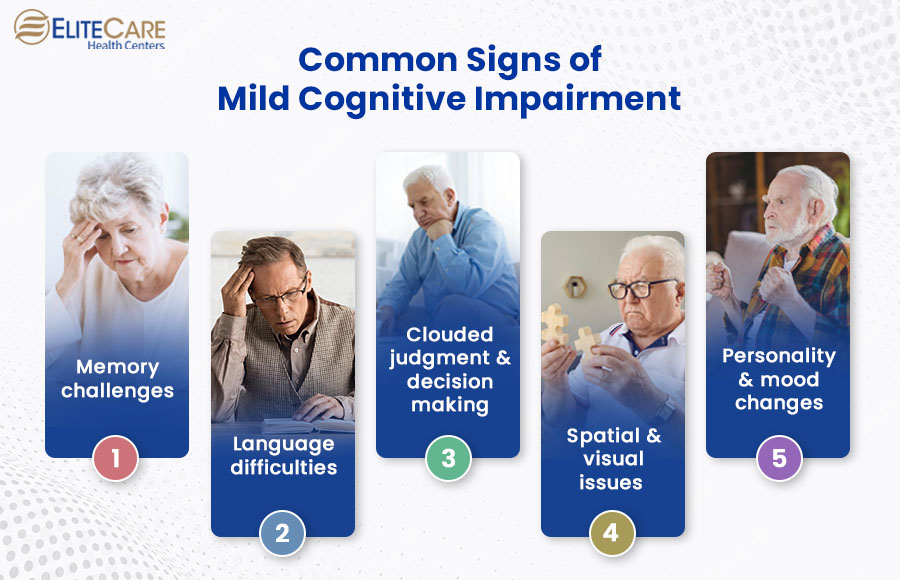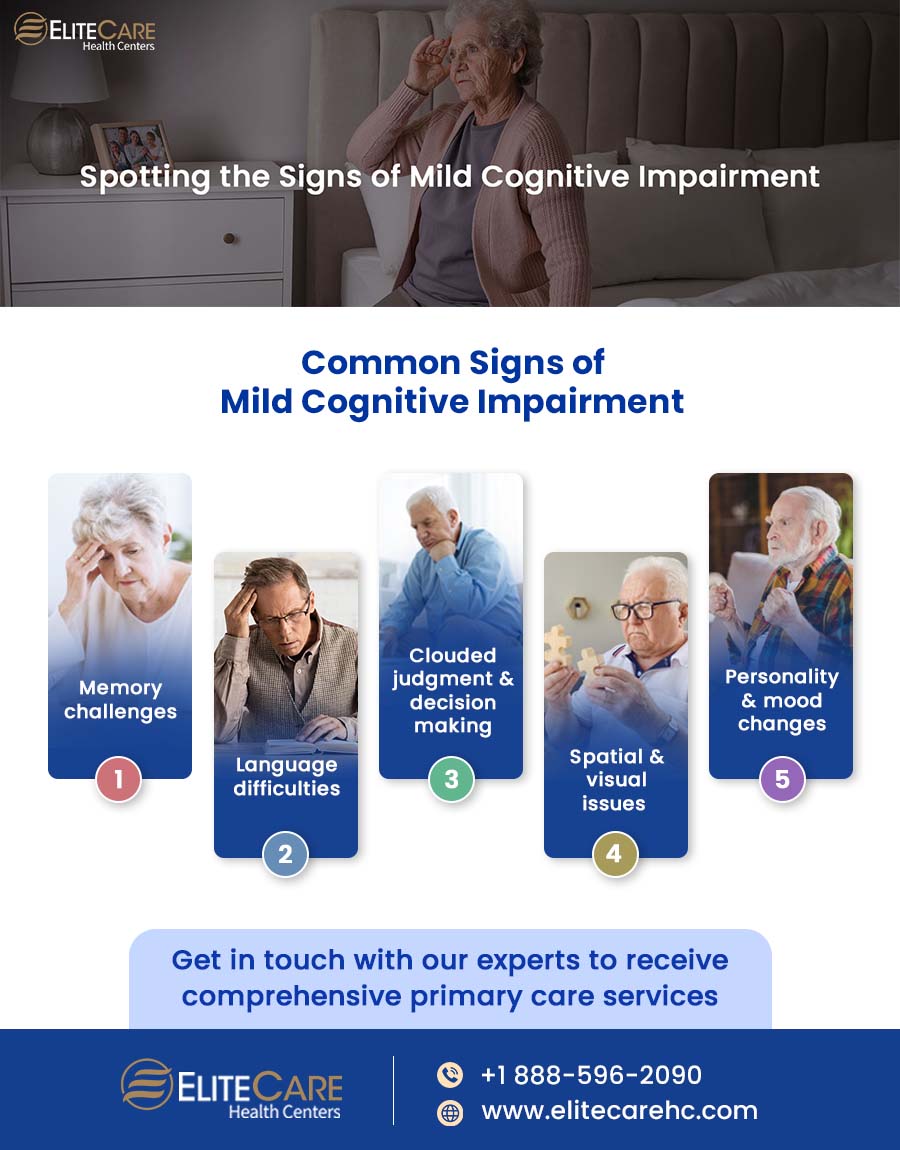
Mild Cognitive Impairment (MCI) is an often-overlooked condition that carries substantial weight for older adults and those concerned about their well-being.
MCI, a common concern among older adults, serves as a critical marker on the path of cognitive aging, signaling that memory and thinking may not be as sharp as they once were. Although it does not reach the severity of dementia, it serves as a notable indicator.
In this blog post, we will define its key characteristics and explore the common signs that seniors and their loved ones should be aware of. We’ll discuss the potential consequences of MCI, particularly its link to dementia, and the importance of seeking professional evaluation for early diagnosis. Furthermore, we’ll examine possible causes, brain changes, risk factors, and complications associated with MCI.
At EliteCare Health Centers, a distinguished health and wellness center, we firmly believe in empowering individuals with knowledge.
What is Mild Cognitive Impairment?
Mild Cognitive Impairment (MCI) can be a perplexing term, but older adults eed to understand. If we were to simplify it, Mild Cognitive Impairment represents the middle ground between the natural cognitive decline that comes with aging and the more severe cognitive impairment seen in conditions like dementia.
Signs of Mild Cognitive Impairment
Being able to recognize the signs of MCI early can lead to better management and improved quality of life. Here are some of the most recognizable signs of MCI:

Memory Challenges: Seniors with MCI may need to remember recent conversations, appointments, or important dates more often than usual. It’s different from occasional forgetfulness, as these memory lapses become more noticeable.
Language Difficulties: MCI can affect language skills. Individuals may struggle to find the right words during conversations, experience difficulty in expressing themselves, or encounter problems with reading and writing.
Judgment and Decision-Making: Impaired judgment is another hallmark of MCI. Older adults may find it challenging to make decisions, especially complex ones, or exhibit poor judgment in various situations.
Spatial and Visual Issues: MCI can impact spatial awareness and visual perception. Older adults might need help navigating familiar routes, reading maps, or accurately judging distances.
Personality and Mood Changes: While mood changes can have various causes, shifts in mood and personality can be indicative of MCI. Older adults may become more anxious, irritable, or withdrawn.
Recognizing these signs is essential. If one observes these changes in themself or a loved one, consulting a primary care physician at a health care clinic offering specialized senior care services is recommended. Early diagnosis and intervention can help manage MCI effectively and maintain cognitive health.
What Seniors Should Note
Older adults must remember that while MCI is a concern, it doesn’t mean they will inevitably develop dementia. Some individuals with MCI remain stable, and a few may even show improvement over time. Understanding MCI is the first step towards proactive cognitive health management, helping seniors make informed decisions about their well-being.
For seniors seeking further guidance and evaluation, EliteCare Health Centers, a trusted medical clinic and healthcare center, is here to provide support and personalized care.
Impact and Risk
Mild Cognitive Impairment (MCI) can have a significant impact on the lives of older adults. Understanding these effects is crucial, as is recognizing the potential risk it carries.
The Impact of MCI
The impact of MCI can be understood in a three-pronged manner:
- Daily Functionality: MCI often leads to difficulties in everyday tasks. Seniors may need help managing finances, keeping appointments, or maintaining personal hygiene.
- Emotional Well-being: The changes in cognitive abilities can result in emotional distress. Individuals may experience frustration, anxiety, or depression as they grapple with memory lapses and other mental challenges.
- Social Isolation: MCI can lead to a decreased desire to engage in social activities. Older adults might withdraw from friends and family due to embarrassment or frustration.
The Link to Dementia Risk
One of the primary concerns surrounding MCI is its association with dementia, particularly Alzheimer’s disease. While not all individuals with MCI develop dementia, it does increase the risk. Studies suggest that roughly 10-15% of individuals with MCI develop dementia each year, compared to 1-2% of the general population.
Learn How to Manage Behavioral Changes in Senior Citizens with Alzheimer’s
Why it’s Crucial to Seek Professional Evaluation
Given the potential consequences, it’s essential to seek professional evaluation when MCI is suspected. An online doctor consultation or an annual physical exam can provide valuable insights into the individual’s cognitive health. Early diagnosis allows for timely intervention and management, which can slow down the progression of cognitive decline.
By addressing MCI promptly, seniors can take proactive steps to maintain their cognitive health, improve their quality of life, and reduce the risk of developing more severe forms of dementia.
Risk Factors and Complications
Understanding the risk factors associated with Mild Cognitive Impairment (MCI) is crucial, especially for older adults, as it can help in early intervention and management. Here, we outline the primary risk factors and potential complications linked to MCI:
Primary Risk Factors for MCI
The following are the primary risk factors for MCI:
- Age: Advancing age is the most significant risk factor for MCI. As individuals grow older, the likelihood of experiencing cognitive changes increases.
- Family History: A family history of Alzheimer’s disease or other forms of dementia can elevate the risk of developing MCI. Genetic factors may play a role.
- Cardiovascular Health: Conditions like high blood pressure, heart disease, and high cholesterol can impair blood flow to the brain, increasing the risk of MCI.
- Diabetes: Poorly managed diabetes can have adverse effects on brain health. Seniors with diabetes need careful monitoring.
- Lifestyle Factors: Smoking, excessive alcohol consumption, a sedentary lifestyle, and a diet high in saturated fats may contribute to MCI risk.
What are the Complications Associated with MCI?
While MCI is often considered an intermediate stage between age-related cognitive decline and dementia, it can lead to various complications:
- Progression to Dementia: A significant concern is that individuals with MCI have a higher risk of developing dementia, especially Alzheimer’s disease, over time.
- Functional Impairments: MCI can affect daily life, making it challenging to manage finances, medications, and daily activities independently.
- Increased Vulnerability: Seniors with MCI may be more susceptible to falls, accidents, and other health issues due to cognitive changes.
It highlights the importance of regular check-ups at primary care centers and engaging in elite health and wellness programs. Early intervention and lifestyle modifications can help manage MCI effectively, potentially slowing its progression and improving cognitive health.
How to Prevent MCI and Maintain Cognitive Health
Promoting cognitive health and reducing the risk of Mild Cognitive Impairment (MCI) is of paramount importance, especially for seniors. Let’s look into some effective strategies and lifestyle choices that can significantly contribute to cognitive well-being:
1. Mental Stimulation
Engaging in mentally stimulating activities can help keep the brain active and agile. Seniors should consider activities such as crossword puzzles, reading, learning a new language, or taking up a new hobby. These activities challenge the mind and promote cognitive health.
2. Balanced Diet
A well-balanced diet is vital for brain health. Seniors should focus on foods rich in antioxidants, Omega-3 fatty acids, and essential vitamins. A diet that includes plenty of fruits, vegetables, whole grains, and lean proteins can support cognitive function.
3. Regular Exercise
Physical activity is closely linked to cognitive health. Seniors should aim for regular exercise, even if it’s light to moderate in intensity. Exercise improves blood flow to the brain, reduces inflammation, and supports the growth of new brain cells.
4. Quality Sleep
Adequate, high-quality sleep is essential for cognitive well-being. Seniors should aim for 7-9 hours of sleep per night. Poor sleep can lead to cognitive decline, so addressing sleep issues is crucial.
5. Social Engagement
Maintaining an active social life can also benefit cognitive health. Seniors should seek opportunities for social interaction, whether through community groups, clubs, or spending time with loved ones. Social engagement stimulates the brain and combats isolation.
6. Stress Management
Chronic stress can have detrimental effects on cognitive function. Seniors should explore stress-reduction techniques like mindfulness, meditation, or yoga to manage stress effectively.
7. Regular Check-ups
Lastly, regular check-ups at primary care centers can help detect and address health issues that may impact cognitive health, such as high blood pressure or diabetes. Early intervention can prevent these conditions from affecting the brain.
By incorporating these strategies into daily life, seniors can take proactive steps to maintain cognitive health and reduce the risk of MCI. Remember, there is always time to start promoting brain health, and small changes can make a significant difference in the long run.
The Bottom Line
To sum up, the potential impact of MCI, particularly its link to dementia, underscores the urgency of proactive cognitive health management. Identifying the risk factors and complications of MCI is crucial for individuals seeking to protect their cognitive health. Knowing the increased risk of developing dementia in those with MCI underscores the importance of seeking professional evaluation.
In this journey towards cognitive health, EliteCare Health Centers stand ready to support seniors with personalized care and expert guidance. Get in touch with our experts to receive comprehensive primary care services.






